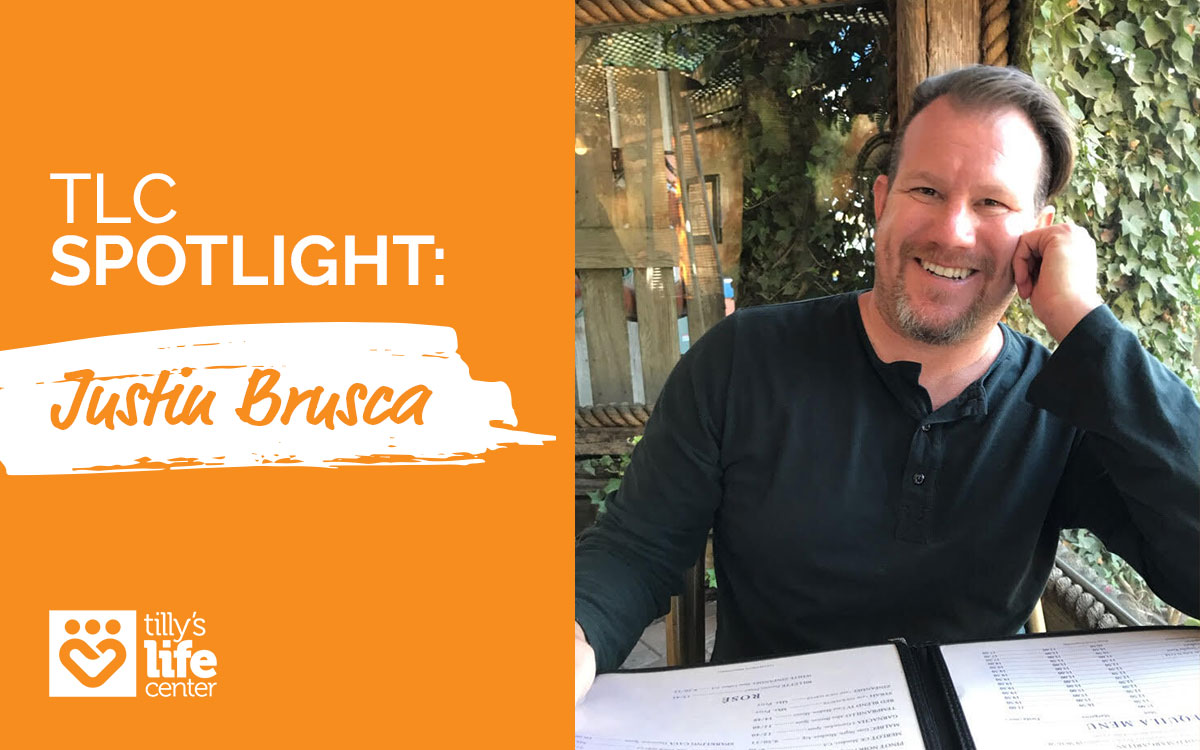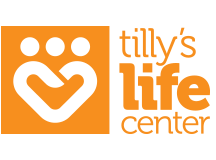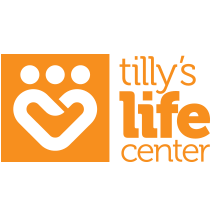
05 Apr TLC Spotlight: Justin Brusca
The work we do at Tilly’s Life Center is so important – especially now. With the in-person and virtual learning environment constantly changing, we couldn’t keep up without amazing facilitators like Justin Brusca.
Serving as a lead facilitator and the program partnerships manager, Justin ensures the students are constantly engaged, and helps keep TLC going by getting the program into schools all over. Let’s dive in and learn more about this SEL extraordinaire!
How do you feel about your work with TLC?
I love it! As a performer, I love to connect to an audience. Often, I’ll use comedy to help the teens feel more comfortable and encourage them to let their guard down. There are no wrong answers in my class!
Working with TLC also helps me as a father of two teen boys. I am able to apply what I teach my students to my parenting, allowing me to see the positive side of any scenario, and how to best help them through. Not to mention it keeps me up to date with all the latest teen trends!
What does a typical day look like for you?
I’m not only a facilitator, but also the program partnership manager. This means my days can be busy! I start by checking emails from the night before, and reviewing the lesson curriculum and plans for the day. Most classes have returned to being on-campus, so I have to drive over to the high school I’m teaching at. Then comes the best part of my day – teaching the workshops. It starts my day off on a positive note, especially when we do mood check-ins with our color-coded bracelets. These let me know how everyone is doing, and what they are feeling that day. After class, we conduct a survey to see how the students did, how engaged they were, etc. If I don’t have any staff meetings, I’ll usually head to other schools to talk with counselors or principals about TLC, and hand out some fun swag to spread the word and encourage them to integrate the program into their school.
How has your job changed since the pandemic began?
The one consistent throughout the pandemic has been the uncertainty. I started with TLC again about 2-3 weeks before the pandemic began, and then things closed down. We were all working from home, and we converted the curriculum into a virtual program using Google slides, and interactive teaching programs like Newrow. The programs were definitely needed during that time, even online. It gave the teens a way to connect with their peers. It is a very different experience from working in the classroom and created a big shift in my daily routine, but overall it’s been so beneficial for the teens to have access throughout this time.
What changes have you seen, emotional or otherwise, in your students since the onset of the pandemic?
The emotional changes students have experienced have been heavy. I have seen it in my own children as well, with both of them struggling in school, and being so concerned about their grades. With my TLC students, their biggest fear was failing in school. Almost every single student, no matter if they were an honors student or not, were concerned about their grades. Many teens are scared about the future, what is going to happen, and if the world is going to end. This has caused so many of them to give up, and not try. They want interactions with others their age, which can cause them to feel isolated and anxious when they don’t get that. I was surprised to learn that all of these emotions actually had physical impacts on them as well, by impacting their sleep patterns, and eating habits.
How can parents of teens support their child during this time?
It’s so important to keep checking in on them as much as possible. Many teens don’t want to talk to their parents about their emotions, but it’s still essential to check in when you can. There is so much they are struggling with, like their own sexual identity, future careers, working a job while being in school, comparing themselves to others, or anxiety about the future. It’s easy to fall behind in school during a time like this, so it’s important as a parent to understand this, and try not to get upset when they aren’t at the top of their game. That’s an area I’ve had to work on with my teen boys, and I try not to get disappointed in them when they don’t do as well as they could in school. It’s more important how they feel, and how they are doing, than how many assignments they are behind on.
Have you experienced any challenges with virtual learning?
Virtual learning is a great alternative, but it definitely brings a lot of challenges with it. Some students aren’t into the online thing, and end up being more closed off, and not as willing to participate. It’s also hard to know how focused the students really are, as many of them don’t have their cameras on. It’s easier for them to be less interactive and less engaged, so I always try to bring even more energy — you have to when you are competing with outside distractions (like their phones) for their attention. Also, in our traditional programs in schools, the students form a bond by the end of the year, and they end up trusting each other more. There is just something about learning in person that you can’t replicate online.
Where do you see SEL programs going in the future?
I’d love to see some type of SEL program in every single school. I think this kind of program should absolutely be part of the standard curriculum at every school. It’s so important to teach teens emotional stability, coping skills, and give them all the tools they need to handle it when things get tough. There’s definitely a place for SEL in every school, and every grade level.
Tilly’s Life Center is so lucky to have incredible, dedicated staff members like Justin! The work we do to support teens would not be possible without them. To learn more about the program, donate, or get TLC into your school, visit https://tillyslifecenter.org/


